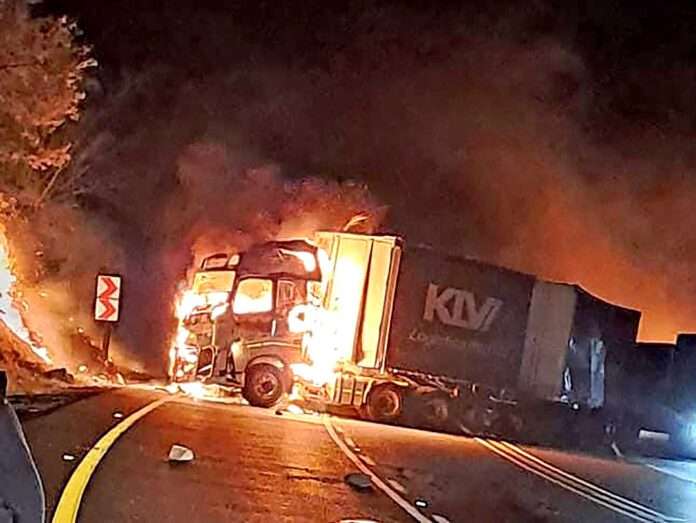When you replace “why is this happening to me” with “what is this trying to teach me”, everything shifts.
At a time when SA marks the second anniversary of “the two weeks in July 2021” – in just one day, eleven trucks were set alight in two incidents on our major road networks, the N3 and N4. Traffic was brought to a standstill on the N3 highway, linking Gauteng and KwaZulu-Natal (KZN), near Van Reenen, following the planned torching of six trucks on Sunday, July 9.
President Cyril Ramaphosa characterised the incidents as economic sabotage.
Again, in a coordinated manner, on the same evening, five trucks were scorched on the N4 linking Gauteng and Mozambique and eSwatini.
All we know is that the assailants travelled in a Toyota Hilux bakkie and a sedan.
On Monday night, two trucks were set alight on the N2, near Empangeni, KZN, bringing the number of torched trucks to 13.
More than half the provincial contribution to the national economy comes from Gauteng at 34.6%, representing R1.5-trillion with 14.3 million people, and KZN at 15.9% representing R692-billion with 11.1 million people.
Western Cape is at 13.7%, representing R596-billion with 6.5 million people.
Gauteng is the seventh largest economy in Africa, with a R4.35-trillion gross domestic product ($286-billion of a $2.3- trillion continental GDP).
The tragedy of these own goals is that the Western Cape is positioning itself as “soon to be number two” with its preparations for an additional 2-million people to settle in the province in the coming years.
The impact of “the two weeks in July 2021” on our economy has made the implementation of our Economic Reconstruction and Recovery Plan even more tenuous. By July 19, more than 350 lives had been lost; 150 000 jobs put at risk; 32 schools vandalised; one school destroyed in a fire in KZN; 40 000 businesses affected; 200 shopping centres and 3 000 stores looted and damaged; 300 bank and post office outlets vandalised; 1 400 ATMs damaged; 161 liquor outlets and 113 communications infrastructure damaged; 11 warehouses, eight factories, damaged, with R1.5-billion worth of stock lost with a resultant R50-billion (R20-billion on KZN) national GDP going up in smoke.
About 1.5 million rounds of ammunition was stolen from a container at a depot in Prospecton. More than 90 pharmacies were destroyed.
The timing could not have been worse. The South African Post Office’s business rescue proceedings will put 7 000 jobs at risk as the embattled state-owned entity plans to save R1.3-billion in annual salaries.
The rand was flat at the start of the week. The local manufacturing and mining data will be released. It will take its cues from big global drivers, and the Abu Dhabi Sovereign wealth fund, Mubadala, plans to establish a banking presence in South Africa through First Abu Dhabi Bank – valued at roughly $51-billion, with a bigger market capitalisation than South Africa’s “big four” banks combined.
Ramaphosa on February 7 2022, authorised the release of the expert panel report probing the civil unrest in parts of Gauteng and KZN in July 2021.
The July of two years ago in KZN and Gauteng can be viewed in the context of multiple crises facing South Africa– the hollowing out of state institutions; high unemployment; youth unemployment hovering above 70%; high levels of poverty and deep inequality, among others.
There is belief the security services are under-staffed and under-resourced and thinly spread out. Several experts argue there are inefficiencies within the security services which if addressed could overcome resource constraints, as would smart partnerships with the private sector, and more effective community engagement.
The absence of reliable intelligence points to an urgent need to implement the recommendations of the High-Level Review Panel on the State Security Agency.
The possibility that the perpetrators of this violence were aware of security services’ weakenesses makes the task of rebuilding a credible intelligence service urgent.
The minister and national commissioner at the time were poles apart in their interpretation of how the July events could have been managed.
This is a matter of concern, as it narrows the grounds for consensus within senior leadership of the police on what needs to be corrected, and who should be held accountable for the failure to prevent the loss of lives and destruction of properties.
- Mohale is Professor of Practice in the Johannesburg Business School, author of the two bestselling books, Lift As You Rise and Behold The Turtle
- Follow @SundayWorldZA on Twitter and @sundayworldza on Instagram, or like our Facebook Page, Sunday World, by clicking here for the latest breaking news in South Africa.



